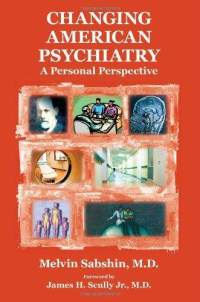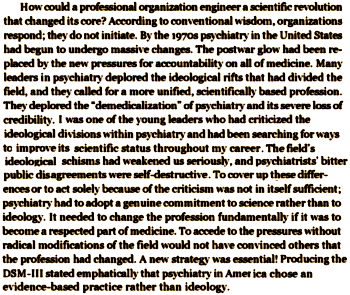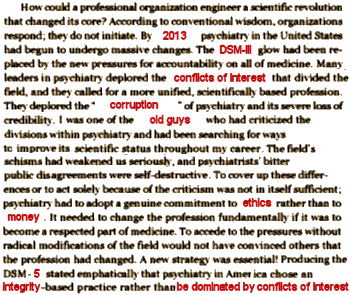Don’t Turn Your Back on Industry, but Keep It Honest
Medscape Psychiatry
by Jeffrey A. Lieberman, MD
Dec 19, 2012My comments are prompted by an article that was published on November 24 in the Washington Post, which was highly critical of GlaxoSmithKline and the pharmaceutical industry because of studies that were done with the hyperglycemic agent Avandia (rosiglitazone), which was subsequently recalled. The last thing I want to be known as is an apologist for the pharmaceutical industry in terms of defending any unscrupulous or mercenary behavior. However, I think we need to be aware of the fact that the pharmaceutical and biotechnology industry is the private sector, which is involved in the drug development enterprise. It is an essential industry in our society and vital to the medical field in terms of being able to further progress in developing treatments for medical illnesses and disease. In other words, we cannot tolerate what would be unprofessional and inappropriate, dishonest, or harmful behavior, but at the same time, we have to resist the temptation to throw the baby out with the bathwater.
The article that was published in the Washington Post was entitled "As Drug Industry’s Influence Over Research Grows, So Does the Potential for Bias." The article was referring to a study that was published in the New England Journal of Medicine on December 7, 2006. The lead author was Dr. Kahn for the ADOPT Study Group, and the study was on the glycemic durability of rosiglitazone, metformin, or glyburide monotherapy. This study was a comparison of oral hyperglycemic agents, and it found that rosiglitazone was superior for glycemic control compared with the other agents. Subsequently, after the drug was released and marketed successfully, concerns about cardiac toxicity emerged. The drug was ultimately recalled, and there have been some medicolegal actions that have occurred in the aftermath.
The Washington Post article reviewed the history of this, calling into question relationships between the investigators from the academic community and the pharmaceutical company, who did not report or failed to detect the signs of safety risks. Therefore, the article pointed the finger at the investigators as having an unhealthy relationship with the pharmaceutical industry. This is extremely worrisome, but the fact of the matter is that this does not mean that the academic medical community and physician investigators should not or cannot be actively involved collaboratively in the drug discovery and development process. Indeed, this type of interaction and collaboration is not just helpful but is essential if we are going to sustain medical progress in developing treatments for human disease. We need to understand that although there have been wrongdoings in some instances by both industry and academic physicians collaborating with industry, we should not throw the baby out with the bathwater. The pharmaceutical and biotech industries are not the tobacco industry. If the tobacco industry went away tomorrow, no one in our society would be necessarily the worse off for it. If the pharmaceutical industry disappeared, we would be in big, big trouble…
APA Answers Criticism of Pharma-Influenced Bias in DSM-5
Medscape Psychiatry
by Deborah Brauser
Jan 04, 2013The American Psychiatric Association [APA] has fired back a strong response to a recent article by the Washington Post questioning the possibility of pharmaceutical industry influence on decisions regarding the upcoming fifth edition of the Diagnostic and Statistical Manual of Mental Disorders (DSM-5). The Post article specifically examined relationships with industry sources, including receiving partial income, for members of the DSM-5 Mood Disorders Work Group and the APA’s Clinical Practice Guidelines Work Group on major depressive disorders. They also discussed the manual’s dropping of the bereavement exclusion, calling that decision a potential "bonanza for the drug companies" and "opening the way for more…to be diagnosed with major depression — and thus, treated with antidepressants."
"While speculation is bound to occur, we think it is important to stay focused on the fact that APA has gone to great lengths to ensure that DSM-5 and APA’s clinical practice guidelines are free from bias," said David Kupfer, MD, chair of the DSM-5 Task Force, in a release. "Throughout the development of each product, APA established, upheld, and enforced its disclosure policies and relationship limits," said Dr. Kupfer. He noted that no DSM-5 task force or work group member is allowed to have more than $10,000 of his or her annual income to be derived from industry sources, nor are members allowed to hold stock or shares valued at more than $50,000 in a pharmaceutical or device company.
With the Post article questioning whether these amounts are still too high, Medscape Medical News asked Dr. Kupfer if the limits should be lowered even more. "When we established the limits on income from industry sources, we looked to make them more stringent than requirements for staff at the National Institutes of Health, members of advisory committees for the Food and Drug Administration, and most academic departments," he answered. Dr. Kupfer added that each member agreed to follow these limits at the start of their work on DSM-5 — and to continue following them as long as they are involved in the development of the manual. "APA has looked to strengthen these policies even further for new clinical practice guidelines in development"…
 So who needs clinical practice guidelines, given our track record with such things [ie TMAP]? And who believes that being on a drug company’s payroll has no effect on one’s opinions? I’ve been thinking more about my hypothesis that the background wheeling and dealing in the American Psychiatric Association with the creation of the DSM-III set up an environment that enabled the corruption that followed [which nail?…]. I still think that, but I now believe that I missed and even more obvious consequence of the goings-on back then. In Dr. Mel Sabshin’s account from those days [Changing American Psychiatry: A Personal Perspective], he made it very clear that he and unnamed others felt that psychiatry needed to make a big change, and that the American Psychiatric Association needed to spearhead that change. Again, whether that was a right or wrong decision isn’t the point of the moment. The point is that under his leadership, the APA became the power base that set and controlled the direction of the specialty. Here’s Dr. Sabshin’s way of saying that again:
So who needs clinical practice guidelines, given our track record with such things [ie TMAP]? And who believes that being on a drug company’s payroll has no effect on one’s opinions? I’ve been thinking more about my hypothesis that the background wheeling and dealing in the American Psychiatric Association with the creation of the DSM-III set up an environment that enabled the corruption that followed [which nail?…]. I still think that, but I now believe that I missed and even more obvious consequence of the goings-on back then. In Dr. Mel Sabshin’s account from those days [Changing American Psychiatry: A Personal Perspective], he made it very clear that he and unnamed others felt that psychiatry needed to make a big change, and that the American Psychiatric Association needed to spearhead that change. Again, whether that was a right or wrong decision isn’t the point of the moment. The point is that under his leadership, the APA became the power base that set and controlled the direction of the specialty. Here’s Dr. Sabshin’s way of saying that again:


“Don’t throw the baby out with the bathwater” should be the APA’s motto. The silverbacks say it so often in print, they must repeat it to each other all the time.
This is an organization that is so corrupt, only felony charges can bring them down.
Does it ever seem to you that the thought process on display here resembles Wayne LaPierre’s?
A rather “defensive” response by Lieberman? A psychiatrist who should know (himself?) better. I like Ivan’s comment.
Mr. ‘Boring Old Man’ – you are anything but. I love your posts and you always seem to hit the nail right on the head.
…you never count your money
When you’re sittin’ at the table
There’ll be time enough for countin’
When the dealin’s done
With much admiration and respect,
Lori
What all these guys are ignoring is the patients–and they are not just a major driver of what is delivered, to who, when and how. They are also the target of vast pharma dollars. Pretty soon, I would expect, you’re going to see ads representing someone grieving after a loved one’s death. And the suggestion that you see a doc for meds.
DTC advertising has played an integral part in the whole collapse of medicine under pharma’s influence–in psychiatry sure, but in many other areas as well. Lieberman recognized this–that’s why he defends the money train.
Never one to defend psychiatry, I nevertheless am finding some striking things in the wonderful book The Emperor of All Maladies:
“doctors, of all people, could not be trusted to perform such an experiment without inherent biases” “doctors are men who prescribe medicines of which they know litte, to cure diseases of which they know less, in human beings of whom they know nothing (Voltaire)” “the surgeons who had so painstakingly created the world of radical surgery had absolutely no incentive to revolutionize it.”
what is the benefit of “medscape psychiatry” as the chosen forum for this discussion?
the only platform available?
target audience?
safe place?
jamzo, Siobhan,
I was thinking about that myself. They’re not responding to the world at large – the audience of the Washington Post. They’re responding to doctors, and more specifically psychiatrists. I think that’s somehow telling, thinking that psychiatrists might be more receptive to the keeping the PHARMA connections alive meme – since in an age of Managed Care and Psychopharmacology, that’s the only allowable act in town.
Other thoughts?
Medscape is bought and paid for by Pharma. Ethics and Medscape in the same sentence is an oxymoron. Here are two looks at Medscape from the heyday of the king of KOLs, Charles Nemeroff: here and here. As for Dr. Jeffrey Lieberman, he has trouble even reading the Medscape scripts fluently.